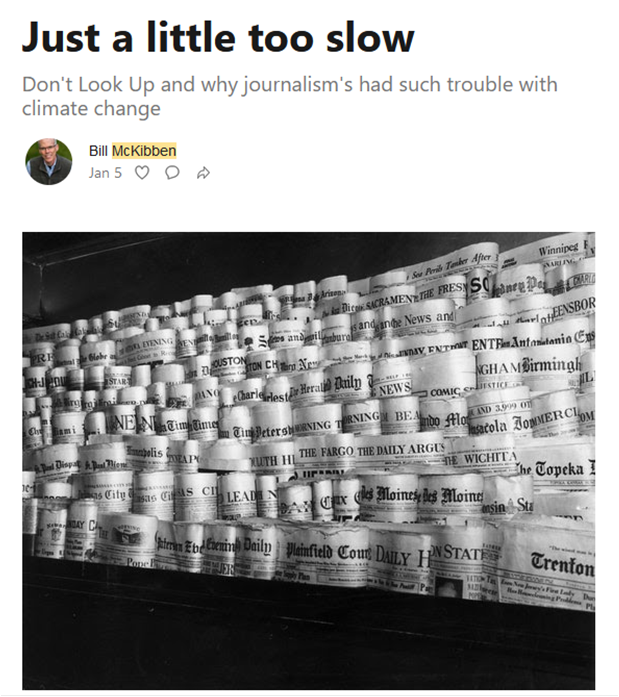Why isn’t the Press tracking the existential crisis overwhelming us?

The climate emergency is an existential crisis for humans. Bill McKibben explains why the Press and politicians ignore the climate emergency even though we risk extinction by ignoring it.
We face an existential crisis of our own making. It threatens to exterminate the human species and most other complex life on our only planet. Yet, day after day, after day, …. the Australian daily press will print multiple pages with nothing but news about the ‘Covid crisis’. And this doesn’t include long articles on the travails of a multi-millionaire anti-vaxer tennis star not being allowed to play his usually tantrum punctuated game at the Australian Open.
At it’s worst, even if nothing is done to minimize its effects, Covid would only kill 1 to 5% of the population. The 1918 ‘Spanish’ flu pandemic (see Wikipedia’s List of Epidemics) killed about this many people. Similarly, 100 years later the Covid Pandemic would be hardly noticed as a minor ripple in human history. Even the Black Death around 1350 that may have killed 50% of all humans at the time had no particularly detrimental consequences on the success of our species.
Today, the ultra-conservative Intergovernmental Panel on Climate Change forecasts utterly dire consequences for humanity and our biosphere if we don’t solve the climate crisis. If we fail here, there will be no human history at all, not just a minor blip! Yet the Press and politicians ignore the climate emergency Surely, this is the crisis that the press should be covering every day.

Journalism is constructed around finding something new. (I think that’s why they’re called newspapers). Which is a problem when it comes to the climate crisis. In geological terms, we are speeding toward the abyss—we’re pouring carbon into the atmosphere hundreds and thousands of times faster than during the volcanic outpourings that marked the previous great extinction events in earth’s history. But in journalistic terms, it happens just a little too slowly to quite register—climate change today is pretty much the same as climate change yesterday and tomorrow. Over a decade or two it will profoundly change the planet, but a decade is not a unit that really registers for TV, much less Twitter. The climate crisis is at all times the most important thing happening on earth, by far, but there’s rarely a twenty-four-hour period when, by the standards we’re used to, it’s the most important thing happening that particular day. It is inexorable, and inexorability is hard for journalists to capture.
…
And so, even though there’s finally skilled and deep coverage of the issue in some corners of the press (I think over the last five years the Times and the Post have done a better job of covering global warming than any other subject, with one remarkable reporting job after another), its scale—the fact that it threatens everything we know and hold dear—hasn’t sunk in. It requires repetition, constant reiteration of the same small set of facts: the planet is heating rapidly, cheap solar and windpower can slow it down, these are being blocked by vested interest. But repetition and constant reiteration are precisely what reporters and editors don’t like doing, hence the constant search for a “new angle.” I follow, for instance, the Twitter feed of Terry Hughes, the Australian marine scientist who has done more than anyone to chart the ongoing realtime destruction of the Great Barrier Reef. If journalism worked better, that destruction—over the course of a very few years, of the largest living structure on the planet—would be a compelling story. But instead, to his constant and correct exasperation, absurd updates about, say, 3-D printers producing new corals help take the edge off the tragedy. They get attention simply because they’re new; the mass death of an enormous ecosystem is the same story as before.
McKibben nails the issues where the 4th Estate (journalism) is concerned, but says nothing (here) about how the press’s selective inattention helps serve the special interests of the patrons and puppet-masters of the 2nd Estate (our government) over the rest of humanity. Unfortunately, here in Australia (and in many other areas of the world) we are cursed by the fact that many of our governing politicians are more concerned to support the selfish short-term special interests of their multi-billionaire patrons rather than the life-time interests of the people who elect them. By default, the press’s easy distraction by trivia, humbug, fake news, misrepresentation, and misdirection so easily created by the special interests and their government lackeys works to hide the real crisis that threatens our survival.
Stopping human greenhouse gas emissions on its own, will probably not be enough. To initiate actual cooling we will probably also have to actively remove carbon from the atmosphere and safely sequester it somewhere that it will not simply return to the atmosphere, and increase Earth’s ability to reflect excess solar energy away from the planet.
One of the few ways I can think of to remedy this situation is to take charge of the electoral process to purge our Parliament of puppets working for special interests and replace them with people we have good reasons to think will understand the real dangers that face us, take the climate emergency seriously as a first priority, and begin the work to mobilize society to begin effective actions to reverse global warming. In every electorate, Vote Climate One’s Traffic Light Voting Guide will help you direct your votes away from the puppets and towards people our research suggests will put climate action first where their parliamentary actions are concerned.